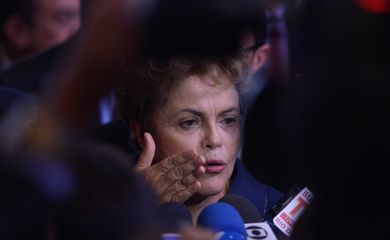Government announces measures amid countrywide protests


The streets were crowded with demonstrations in major cities throughout Brazil in protest against the government on Sunday (March 15). Above: Copacabana Beach, Rio

The government announced on Sunday (Mar. 15) it is going to submit a package of anti-corruption and accountability measures to Congress, and emphasized the need to ban corporate campaign finance.
The announcement was made amid countrywide protests that drew thousands of Brazilians to the streets against corruption and President Dilma Rousseff's administration. The protests were peaceful and no clashes were reported.
Called to speak on behalf of the government, the Justice Minister, José Eduardo Cardozo, and the president's chief administrative aide, Miguel Rossetto, said President Dilma Rousseff's position is that Brazilians are longing to see more effective ways of fighting corruption.
According to Cardozo, the government started working on the proposals in the beginning of the year, but due to technical and legal details, they had not been able to complete the final draft. “There were pending issues that had to be discussed by the new government. It's March and the president announced in her inaugural address that these measures were to be introduced within six months. But we'll put them to vote well before that,” the minister said.

Justice Minister José Eduardo Cardozo
Across Brazil, the anti-government demonstrations went peacefully on Sunday. In São Paulo, Brazil's largest city, at least one million people rallied in the city center, the military police reported. In Campinas, the second largest city in the state, thousands of people also held a peaceful demonstration.
In Rio de Janeiro, some 15,000 people were reported by organizers to join the rally on Copacabana Beach in the morning. In the afternoon, the demonstration was mostly concentrated in the city center, where streets were closed off. Using loudspeaker vehicles, the protesters criticized the government and corruption. Other groups were calling for the return of the military to power and marched singing army anthems.
In the country capital, Brasília, an officially estimated 45,000 people protested in the Ministries Esplanade. With banners demanding an end to corruption and Rousseff's impeachment, protesters marched to the Congress, where they opened out a huge Brazil flag and sang the National Anthem.
In Goiânia, roughly 200 kilometers from Brasília, some 60,000 people joined a peaceful 4-kilometer protest march.
In Porto Alegre, South region, the protesters were concentrated in the Moinhos de Vento and Parque da Redenção neighborhoods. According to the Military Brigade, about 100,000 people joined the protests, with no reported incidents. In Curitiba, Paraná, around 80,000 people gathered in the central area, and there, too, the event went smoothly.
In the Northeast, protests were held in Salvador (Bahia), Recife (Pernambuco), Aracaju (Sergipe), and other state capitals, and also drew thousands to the streets, with no reported violence. In Fortaleza, the demonstration brought between 15,000 and 20,000 to Aldeota, an upscale neighborhood in the city. Most participants were wearing flag-colored clothes and raised banners with messages rejecting President Rousseff and the ruling Workers' Party (PT).
Protesters also took to the streets in major cities in the North region. In Manaus, Amazonas, 22,000 people joined the protests on major avenues in the city center. In Belém, Pará, demonstrators marched in the city center dressed in yellow and green, carrying banners criticizing the government and calling for Rousseff's impeachment.
In Belo Horizonte, capital of Minas Gerais, some 24,000 people gathered in Liberty Square. The demonstration followed until about 13h, when the crowd dispersed with no reportable incidents.
Ministers Cardozo and Rossetto made some remarks on calls for military intervention or the dismantling of such public institutions as the Federal Supreme Court. For Rossetto, even though this was the agenda of a minority in the crowd, it is not acceptable and must be strongly opposed, even by the other, more democratic protesters.
“Brazilian society should reject this kind of undemocratic attitude. Rather than criticism of President Dilma's administration, these messages are an assault on democracy and can't be tolerated,” he said.
Cardozo noted that the government has been advocating a political reform since its election campaign. In his opinion, the most pressing issue is how the political campaigns are funded. “We can't accept the corporate funding of political campaigns any more. We must close this door [on corruption] immediately,” he said.
Translated by Mayra Borges
Fonte: Government announces measures amid countrywide protests



